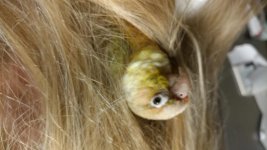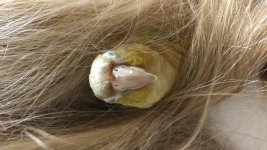Goldenconure1
New member
- Aug 23, 2018
- 44
- 1
I have visited him 3 times now, and he is 12 weeks old still being hand fed but out of the incubator.
I am wondering if a baby can reject someone. I ask because when I take him out he sort mum is into me but then sort of runs away and squaks a ton. He also avoids looking me in the eye. When my parents handled him he stayed put and just stared at them in the face and quieted down and interacted with them in a much calmer fashion.
Is this possibly bad for me, as he will be living with only me. And I do not want to get a bird that seems already uncomfortable with me. (If anything I can always switch my down payment to another, younger golden conure. The one I have money down on now is about 12 and a half weeks and I do have a suspicion he palpably doesn't really like me, especially because he acts very very differently with my parents and friends that have handled him. But for me he seems to avoid as much contact as possible)
I am wondering if a baby can reject someone. I ask because when I take him out he sort mum is into me but then sort of runs away and squaks a ton. He also avoids looking me in the eye. When my parents handled him he stayed put and just stared at them in the face and quieted down and interacted with them in a much calmer fashion.
Is this possibly bad for me, as he will be living with only me. And I do not want to get a bird that seems already uncomfortable with me. (If anything I can always switch my down payment to another, younger golden conure. The one I have money down on now is about 12 and a half weeks and I do have a suspicion he palpably doesn't really like me, especially because he acts very very differently with my parents and friends that have handled him. But for me he seems to avoid as much contact as possible)

